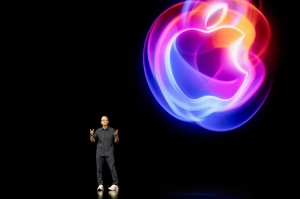News
Apple unveils new iPhone built for AI


CEO of Apple Tim Cook gives a presentation as Apple holds an event at the Steve Jobs Theater on its campus in Cupertino, California on Monday. Apple announced a new iPhone built for generative artificial intelligence as it seeks to boost sales and show it is keeping up in the technology race.
Apple on Monday announced a new iPhone built for generative artificial intelligence as it seeks to boost sales and show it is keeping up in the technology race.
The tech giant has a lot riding on what would be the iPhone 16 and will hope that customers are enticed to buy the latest models, attracted by new AI powers.
“We are thrilled to introduce the first iPhones designed from the ground up for Apple Intelligence and its breakthrough capabilities,” Apple chief executive Tim Cook said at an event at the iPhone-maker’s Silicon Valley headquarters.
With $39bn in sales last quarter, the iPhone counts for roughly 60% of Apple’s revenue, and remains the main entryway to the company’s services, such as the App Store or Apple TV, which are becoming a growing part of its business.
Apple is only just coming out of a long sales slump as users increasingly stick with older models longer.
“This iPhone 16 release is all about Apple Intelligence and the unleashing of the consumer AI Revolution through Cupertino,” Wedbust analyst Dan Ives said in a note to investors, referring to Apple’s home city. “In essence Cupertino will be the gatekeeper of the consumer AI Revolution.”
“Apple Intelligence” is a new suite of software features for all devices that was announced in June at the company’s annual developers conference, where it also announced a partnership with ChatGPT-maker OpenAI.
“For years, artificial intelligence and machine learning have been essential in delivering so many of the features and experiences you love,” Cook said. “In June, we launched Apple Intelligence, our powerful new personal intelligence system, which will have an incredible impact.”
In the short-term, these include AI-infused image editing, translation, and small, creative touches in messaging, but not more ambitious breakthroughs promised by other AI players, such as OpenAI or Google.
Ives expects software makers to begin cranking out apps and services tuned with generative AI capabilities, fuelling sales of iPhones.
Apple is expected to tailor new AirPod ear buds and smart watches to take advantage of AI capabilities and Siri digital assistant.
The company announced new models of Apple Watch and AirPods at the event.
By adding AI capabilities, Apple is looking to “shake that expectation” that iPhone launches are “just steady improvements in hardware and software,” said Techsponential analyst Avi Greengart.
Longer term, Apple could dramatically change the iPhone experience with a “super-powered Siri” working across all the apps, Greengart said.
Apple’s announcement closely follows Google, which last month unveiled AI-infused Pixel 9 smartphones, its challenge to the iPhone.
Pixels account for a tiny sliver of the global smartphone market dominated by Samsung and Apple, but Google argued its new line is a chance to answer what — after all the hype — AI can actually do for customers.
The tech giant has a lot riding on what would be the iPhone 16 and will hope that customers are enticed to buy the latest models, attracted by new AI powers.
“We are thrilled to introduce the first iPhones designed from the ground up for Apple Intelligence and its breakthrough capabilities,” Apple chief executive Tim Cook said at an event at the iPhone-maker’s Silicon Valley headquarters.
With $39bn in sales last quarter, the iPhone counts for roughly 60% of Apple’s revenue, and remains the main entryway to the company’s services, such as the App Store or Apple TV, which are becoming a growing part of its business.
Apple is only just coming out of a long sales slump as users increasingly stick with older models longer.
“This iPhone 16 release is all about Apple Intelligence and the unleashing of the consumer AI Revolution through Cupertino,” Wedbust analyst Dan Ives said in a note to investors, referring to Apple’s home city. “In essence Cupertino will be the gatekeeper of the consumer AI Revolution.”
“Apple Intelligence” is a new suite of software features for all devices that was announced in June at the company’s annual developers conference, where it also announced a partnership with ChatGPT-maker OpenAI.
“For years, artificial intelligence and machine learning have been essential in delivering so many of the features and experiences you love,” Cook said. “In June, we launched Apple Intelligence, our powerful new personal intelligence system, which will have an incredible impact.”
In the short-term, these include AI-infused image editing, translation, and small, creative touches in messaging, but not more ambitious breakthroughs promised by other AI players, such as OpenAI or Google.
Ives expects software makers to begin cranking out apps and services tuned with generative AI capabilities, fuelling sales of iPhones.
Apple is expected to tailor new AirPod ear buds and smart watches to take advantage of AI capabilities and Siri digital assistant.
The company announced new models of Apple Watch and AirPods at the event.
By adding AI capabilities, Apple is looking to “shake that expectation” that iPhone launches are “just steady improvements in hardware and software,” said Techsponential analyst Avi Greengart.
Longer term, Apple could dramatically change the iPhone experience with a “super-powered Siri” working across all the apps, Greengart said.
Apple’s announcement closely follows Google, which last month unveiled AI-infused Pixel 9 smartphones, its challenge to the iPhone.
Pixels account for a tiny sliver of the global smartphone market dominated by Samsung and Apple, but Google argued its new line is a chance to answer what — after all the hype — AI can actually do for customers.



